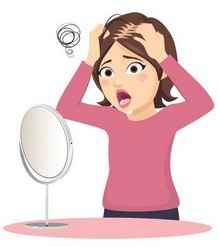If you have been struggling with hair loss and wondering if Inflammation causing hair loss is an issue, you are not alone. Many people have asked does scalp inflammation causes hair loss. The answer is yes, it can. Inflammation of the scalp can be caused by a variety of factors, including environmental factors, hormonal imbalances, stress, and even certain medications. In this blog post, we will discuss how to heal your scalp and reverse the damage caused by Inflammation causing hair loss.
Why inflammation is causing me to lose hair?
Like nothing else, losing our hair may negatively impact our self-esteem. Some of the psychological repercussions of hair loss and thinning can be quite debilitating and have a negative impact on a woman’s quality of life. Numerous variables, including nutrition and genetics, contribute to hair loss.
One factor unites many of these medical reasons for hair loss: Inflammation. It’s interesting that inflammation results in hair loss in the manner that is described next.
There are many possible causes of scalp inflammation, including skin conditions, stress, hormonal imbalances, allergies, or autoimmune diseases such as psoriasis or lupus.
In addition to scalp inflammation, other long-term forces can also contribute to hair loss. These include dietary deficiencies, chemotherapy, radiation therapy, and chronic illnesses such as gout. Each of these can cause inflammation in the body, which can then lead to hair loss.
When it comes to scalp inflammation, there are several treatment options available. Depending on the underlying cause, a doctor may prescribe topical medications to reduce inflammation and soothe the scalp. If the cause is a bacterial infection, antibiotics may be prescribed. Other treatments may include lifestyle changes such as eating a healthy diet and reducing stress levels. In severe cases, surgery may be required.
It’s important to remember that not all hair loss is caused by inflammation. If you are experiencing excessive hair loss, it’s best to seek medical attention to determine the underlying cause and get the best treatment for your condition.
inflammation in the body and hair loss
Although Inflammation is sometimes viewed as a necessary evil, it may also benefit the body.
And what exactly is Inflammation?
Inflammation, in essence, is the immune system’s method of defending the body against damage, sickness, and “invasion” (1). It’s a sophisticated cascade of pro-inflammatory and anti-inflammatory mediators that play a critical function in protecting your cells and organs from injury.
Unfortunately, Inflammation has the potential to persist over time. When the inflammatory response is not effectively controlled, which can be brought on by a number of circumstances, this happens (2).
Does scalp inflammation cause hair loss?
The answer is, yes! Inflammation often and generally happens when the body must defend against invasive pathogens (3). The immune system of the body occasionally mistakes bodily cells and organs for foreign invaders and launches an attack against them.
The body’s immune system may view the hair follicles as foreign invaders, and it frequently kills them. This causes alopecia, or inflammation-based hair loss, which is a medical disorder.
The immune system will harm the scalp during this period, and the hair roots won’t be able to get enough nutrients (4). This is how Inflammation and hair loss are related.
Inflammation-induced scalp injury is typically accompanied by a burning sensation and a few red itchy areas. Additionally, Inflammation and peeling of the skin may occur on the scalp.
Symptoms of hair loss due to inflammation
An increase in temperature is a major indication of Inflammation. The increased blood flow in the area of the body that is inflamed is often to blame for this. An additional indication of Inflammation is:
Swelling
The buildup of fluid at the inflammatory site is what causes this.
Redness
The increased blood flow in the region is another factor contributing to this.
Pain
This happens when substances that activate nerve endings are released.
Function Loss at the Inflammation Site
This may result in thinning and, eventually, less hair growth on the scalp.
Digestion issues
While Inflammation may mostly affect one part of the body, it can also be a systemic issue. It follows that all or most body systems are impacted.
This might lead to nutritional malabsorption, gas, bloating, constipation, and diarrhea.
The relationship between Inflammation and the digestive system isn’t that hard to accept, as there may even be evidence that poor gut homeostasis causes systemic Inflammation (5).
Fatigue
According to the most recent studies on the subject, Inflammation and chronic weariness are related (6).
As a result, untreated Inflammation may cause you to feel strangely exhausted.
What Causes Inflammatory Hair Loss in Women?
Given the connection between Inflammation and hair loss, ladies should take precautions to stop the root of the issue. To start, they should educate themselves on the reasons why Inflammation occurs.
Virus, bacterial, or fungal infection
Low-grade bacteria, viruses, and fungi in the circulation and in several human organs are major contributors to Inflammation. H pylori are one kind of bacterium that has been linked to inflammation (7). This bacterium causes not only Inflammation but also ulcers.
This bacterium is thought to be present in the stomachs of roughly half of all persons over the age of 40. (8). As previously discussed, the body’s defensive mechanism will attempt to battle these components, which will ultimately hurt the body.
In certain instances, an imbalance of bacteria and fungus in the stomach will lead the immune system to simply respond (9). This will not normally generate noteworthy symptoms. The majority of the time, a healthy diet, colostrum supplementation, and high-quality probiotics may correct this imbalance.
Allergic Response
Inflammation in the body is also a result of allergic responses. The immune system is overworked by this situation and is compelled to eliminate the allergen. The confusing aspect of allergies is that they can alter and evolve over time. You can develop an allergy to eggs and go from being able to eat an omelet every morning (yes, really). Don’t presume that this isn’t an issue for you straight away just because it hasn’t been in the past.
Stress, both physical and emotional
Inflammation is also more likely to affect women who are under a lot of physical, psychological, and emotional stress—which is the majority of us, right? This is due to the fact that anxiety raises the amount of the hormone cortisol in our bodies, which causes a series of harmful effects (10, 11).
The presence of toxins
Inflammation can also result from pollutants in the air, water, and metals like mercury and chlorine (12). Due to the numerous additional health issues they create, these poisons should be avoided. One approach to lessen exposure to pollutants is through a clean diet. Reverse osmosis equipment can be added to your home’s water sources as another fast cure.
A Sedentary Way of Life
Our sedentary, unhealthy lifestyles may also contribute to this issue. They should choose an active way of life and always get adequate sleep at night. Additionally, maintaining a balanced diet and getting enough water into your system will stop Inflammation in the body.
- AI Powered Bald Filter Online 2024: See Yourself with No Hair! - January 19, 2024
- Harklinikken Bad Reviews 2024: Analyzing Negative Feedbacks - January 18, 2024
- How to Get the Alex Eubank Hair | Step-By-Step Tutorial 2024 - January 18, 2024







